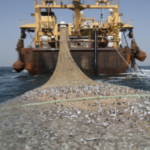Masslos überfischt: Heringe, Sardinen, Sardellen
Wild lebenden «Futterfische» wie Sardinen, Sardellen oder Heringe werden heute massiv überfischt. Ihr Bestand ist auf unter zwanzig Prozent des Bestandes von 1960 gesunken. Diese Fische dienen den Fischzuchten an den Küsten als Hauptnahrung (In der Migros und im Coop sind schon die Hälfte aller Fische Zuchtfische). Zudem werden Sardinen, Heringe und Sardellen tonnenweise zu Katzenfutter verarbeitet!
Eine zentrale Funktion in der Nahrungskette
Die Futterfische ernähren sich von Kleinstlebewesen und dienen gösseren Fischen und Vögeln als Nahrung.Ohne diese Futterfische gibt es keine Meeressäuger, keine Thunfische, keine wilden Lachse, keinen Kabeljaus (Dorsche) und auch keine Seevögel.
Deshalb wird das Überfischen zu einem grosse Problem. In internationalen Gewässern gelten einige wenige Fischfangquoten, doch es gibt keine internationale Polizei und keine Strafen. Viele Länder subventionieren ihre Fangflotten massiv, damit diese im internationalen Rennen um die Fische einen grösseren Anteil ergattern können. Mit über 30 Milliarden Dollar (!) subventionieren Staaten ihre Fischflotten, wie dem Welthandelsreport der WTO zu entnehmen ist. Und dies unter dem Siegel des freien marktwirtschaftlichen Handels.
Alarm schlagen jetzt erneut unabhängige Meeresforscher: Der Fang von Futterfischen müsse «mindestens halbiert» werden, fordern sie.
—
REPORT «LITTLE FISH, BIG IMPACT»: ZUSAMMENFASSUNG IM ORIGINALTON
Brief summary
Forage fish are small to medium-sized species that include anchovies, herring, menhaden, and sardines. Direct catch of forage fish makes up more than one-third of the world’s marine fish catch and has contributed to the collapse of some forage fish populations. In the most comprehensive global analysis of forage fish management to date, the Task Force found that conventional management can be risky for forage fish because it does not adequately account for their wide population swings and high catchability. It also fails to capture the critical role of forage fish as food for marine mammals, seabirds, and commercially important fish such as tuna, salmon, and cod. The report recommends cutting catch rates in half in many ecosystems and doubling the minimum biomass of forage fish that must be left in the water, compared to conventional management targets. Even more stringent measures are advised when important biological information is missing.
Recommendations
The Task Force therefore recommends that, in most ecosystems, fishing should be half the conventional rate or less and leave at least twice as many forage fish in the ocean.
DAS INTERNATIONALE FORSCHERTEAM
Dr. Ellen K. Pikitch, Chair, Professor and Executive Director of the Institute for Ocean Conservation Science, School of Marine and Atmospheric Sciences, Stony Brook University, USA
Dr. P. Dee Boersma, Professor and Director of the Center for Penguins as Ocean Sentinels, University of Washington, USA
Dr. Ian L. Boyd, Professor and Director of the NERC Sea Mammal Research Unit and the Scottish Oceans Institute, University of St Andrews, UK
Dr. David O. Conover, Professor, School of Marine and Atmospheric Sciences, Stony Brook University, USA
Dr. Philippe Cury, Director of the Centre de Recherche Halieutique Mediterranéénne et Tropicale, France
Dr. Tim Essington, Associate Professor, School of Aquatic and Fishery Sciences, University of Washington, USA
Dr. Selina S. Heppell, Associate Professor, Department of Fisheries and Wildlife, Oregon State University, USA
Dr. Edward D. Houde, Professor, University of Maryland Center for Environmental Science, Chesapeake Biological Laboratory, USA
Dr. Marc Mangel, Distinguished Professor and Director of the Center for Stock Assessment Research, University of California, Santa Cruz, USA
Dr. Daniel Pauly, Professor, Fisheries Centre, University of British Columbia, Canad
Dr. Eva Plaganyi, Senior Research Scientist, Marine and Atmospheric Research, CSIRO, Australia
Dr. Keith Sainsbury, Professor, Institute of Marine and Antarctic Science, University of Tasmania, Australia, and Director of SainSolutions Pty Ltd.
Dr. Robert S. Steneck, Professor, School of Marine Sciences, University of Maine, USA
Project Director: Christine Santora, Institute for Ocean Conservation Science, School of Marine and Atmospheric
Sciences, Stony Brook University, USA
Policy Advisor: Christopher Mann, Pew Environment Group, Washington D.C. USA
Themenbezogene Interessenbindung der Autorin/des Autors
keine









